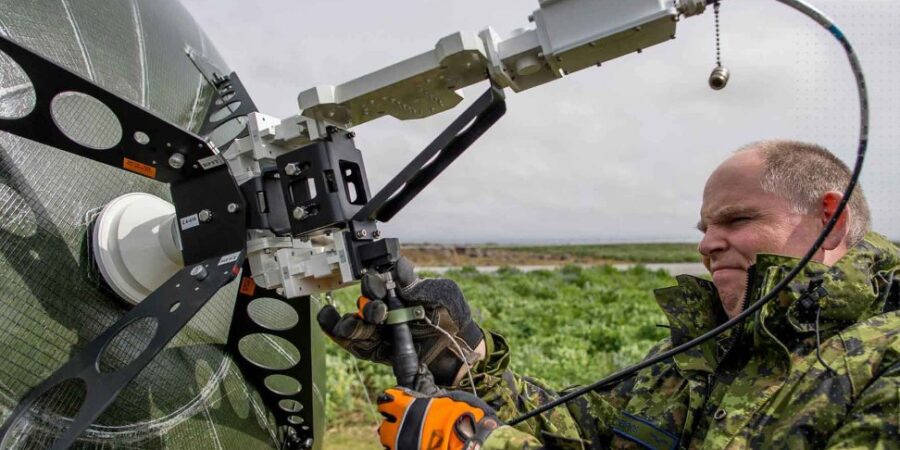Opportunity
Do you love travelling, flying and working as part of a team? A career in the Canadian Armed Forces (CAF) as an Aerospace Telecommunications and Information Systems Technician can give you an opportunity to work at most bases both domestically and abroad in support of Air, Land and Sea Operations.
Overview
Aerospace Telecommunications and Information Systems Technicians perform, supervise and direct the repair and maintenance of all types of Air Force & Joint telecommunications and information systems. They also manage and maintain mobile and fixed satellite communications systems, microwave systems, switchboards, cable plants, and all forms of command and control computer systems and networks.
Aerospace Telecommunications and Information Systems Technicians perform preventive and corrective maintenance, system restoration, special inspections, modifications, installations and acceptance checks, as well as the repair and overhaul of all types of telecommunications, navigation and cryptographic systems.
Their primary responsibilities are to:
- Perform preventive and corrective maintenance on all types of radios, radar and data processing, cryptographic, terminal, audio and video equipment
- Perform inspections, performance tests and adjustments on strategic and tactical fixed and mobile telecommunications equipment
- Perform repairs, overhaul and support maintenance on telecommunications equipment
- Perform installations and acceptance tests
- Liaise with all levels of command and functional groups, including base level personnel
- Maintain and/or advise other occupations on the maintenance of the electromechanical and refrigeration requirements of telecommunications equipment
- Deploy as part of the Air Force Support Capability as part of 8 Air Communications and Control Squadron, as part of a Tactical Control Radar Squadron, as part of the Canadian Forces Joint Signals Regiment or as part of all CANSOFCOM Units
- Manage the life-cycle of material related to various telecommunications and information systems
To be eligible to apply to the CAF, you must:
- Be a Canadian citizen
- Be at least 18 years old (17 years old with parental consent), except:
- For the Paid Education programs—you may be 16 years old (with parental consent)
- For the Primary Reserves—you may be 16 years old (with parental consent) and must be enrolled as a full-time student; and
- Have completed at least Grade 10 or Secondaire IV in Québec (some jobs need higher levels of education)
Basic Military Qualification
The first stage of training is the Basic Military Qualification course, or Basic Training, held at the Canadian Forces Leadership and Recruit School in Saint-Jean-sur-Richelieu, Quebec, or through disparate Training Establishments across Canada from Esquimalt, British Columbia to Halifax, Nova Scotia. This training provides the basic core skills and knowledge common to all trades. A goal of this course is to ensure that all recruits maintain the Canadian Armed Forces (CAF) physical fitness standard; as a result, the training is physically demanding.
Aerospace Telecommunications and Information Systems Technicians Training
Aerospace Telecommunications and Information Systems Technicians attend the Canadian Forces School of Communications and Electronics in Kingston, Ontario, to complete the Performance Oriented Electronics Training course which includes the following topics:
- Circuits Theory
- Electro-Mechanical and Solid State devices
- Power sources
- Amplifier, Oscillator and Digital circuits
- Multistage electronic circuits
- Conductors and cables
- AM/FM Theory
- Audio/Video equipment
- Computers and peripherals
They continue with 20 weeks of training specific to their duties:
- Technical administration
- Automated information systems
- Switchboards and terminal equipment
- Cable distribution systems
- Data communication systems
- Audio and video systems
- Airfield navigational aids and meteorological systems
- Communications and crypto systems
- Radar systems
Specialty Training
Aerospace Telecommunications and Information Systems Technicians may be offered the opportunity to develop specialized skills through formal courses and on-the-job training, including:
- Airport Secondary/Surveillance Radar
- Communications Control Systems
- Precision Approach Landing Aids
- E3A AWACS Airborne Equipment
- Microwave Radio Systems and Associated Equipment
- Instructional Techniques
- Communications/Information Security
- Meteorological Systems
- Cryptographic Equipment Maintenance
Available Advanced Training
As they progress in their career, Aerospace Telecommunications and Information Systems Technicians who demonstrate the required ability and potential will be offered advanced training. Available courses include:
- Fibre Optics Communications Systems
- Design Building Network for Communication Systems
- Computer System Management
- Advanced Radar Maintenance
- Advanced Communications Operations
- Management and Leadership Training
- Deployed Communications Systems
Required Education
The minimum required education to apply for this position is the completion of the provincial requirements for Grade 10 or Secondaire IV in Quebec with Grade 10 applied Math or Math 426 in Quebec. Foreign education may be accepted.
Direct Entry
If you already have a college diploma, the CAF will decide if your academic program matches the criteria for this job and may place you directly into the required on-the-job training program following basic training. Basic training and military officer qualification training are required before being assigned.
To apply you should be a Canadian citizen or permanent resident
At least 18 years old (17 years old with parental consent)
Have completed at least Grade 10 or 24 credits of Secondary IV in Quebec (some jobs need higher levels of education)
Others interesting jobs : Automotive parts sales clerk – counter – retail
- Les 15 Métiers les Plus Tendance au Canada en 2024
- Nouveau Pays, Nouveau Départ : Comment Réussir Votre Réseau de Carrière en Tant qu’Immigrant ?
- Coût élevé des services de recrutement
- Stratégies de Rétention des Employés : Astuces pour Fidéliser Vos Talents
- Comment Gérer le Stress Pendant la Recherche d’Emploi ?
- Comment Attirer et Retenir les Candidats Qualifiés ?









Leave a Reply